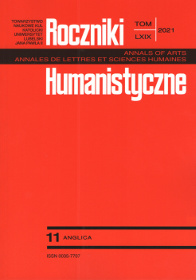Black Ghosts of the Diasporic Memory in Jesmyn Ward’s Sing, Unburied, Sing
Abstrakt
Czarne duchy pamięci diaspory w Śpiewajcie, z prochów, śpiewajcie Jesmyn Ward
W powieści Jesmyn Ward Śpiewajcie, z prochów, śpiewajcie (2017) afroamerykańska rodzina musi stawić czoła duchom przeszłości jak i teraźniejszości, wskrzeszając dawno pogrzebane historie, które są ściśle splecione z dziedzictwem niewolnictwa i erą surowych praw Jima Crowa. Artykuł stawia tezę, iż powieść bierze udział w reinterpretacji postaci ducha jako uzdrawiającego czynnika, który należy koniecznie uwzględnić w procesie odzyskiwania pamięci. Dlatego ożywienie pamięci afrykańskiej diaspory przyspiesza spotkanie z duchami, dzięki czemu rodzina może rozpocząć proces uleczania, otrzymując narzędzia i wzorce umożliwiające pogodzenie się z dziedzictwem niewolnictwa i współczesnymi przejawami rasizmu.
Bibliografia
Alexander, Michelle. The New Jim Crow Mass Incarceration in the Age of Colorblindness. The New Press, 2010.
Assman, Jan. “Collective Memory and Cultural Identity.” Translated by John Czaplicka, New German Critique, vol. 65, 1995, pp. 125–133.
Brown, Wendy. “Specters and Angels at the End of the Story.” Vocations of Political Theory, edited by Jason A. Frank and John Tambornino, U of Minnesota P, 2000, pp. 34–45.
Carpenter, Lynette. “Introduction”. Haunting the House of Fiction: Feminist Prespectives on Ghosts Stories by American Women, edited by Lynette Carpenter and Wendy K. Kolmar, U of Tennessee P, 1991, pp. 1–25.
Carpenter, Lynette, and Wendy K. Kolmar, editors. Haunting the House of Fiction: Feminist Perspectives on Ghost Stories by American Women. U of Tennessee P, 1991.
Chang, Shu-li. “Daughterly Haunting and Historical Traumas: Toni Morrison’s Beloved and Jamaica Kincaid’s The Autobiography of My Mother.” Concentric, vol. 30, no. 2, 2004, pp. 105–127.
Chassot, Joan. Ghosts of the African Diaspora: Re-visioning History, Memory and Identity. Dramouth College P, 2018.
Cucarella-Ramon, Vicent. “Biblical Echoes and Communal Home in Jesmyn Ward’s Salvage the Bones.” Miscelanea: A Journal of English and American Studies, vol. 62, 2020, pp. 91–107.
Dib, Nicole. “Haunted Roadscapes in Jesmyn Ward’s Sing, Unburied, Sing.” MELUS, vol. 45, no. 2, 2020, pp. 134–153.
Fedorko, Kathy A. “Edith Wharton’s Hauned Fiction: ‘The Lady’s Maid’s Bell’ and The House of Mirth.” Haunting the House of Fiction: Feminist Perspectives on Ghost Stories by American Women, edited by Lynette Carpenter and Wendy K. Kolmar, U of Tennessee P, 1991, pp. 80–107.
Harris, Trudier. Fiction and Folklore: The Novels of Toni Morrison. U of Tennessee P, 1991.
Hartman, Saidiya. Scenes of Subjection: Terror, Slavery, and Self-Making in Nineteenth-Century America. Oxford UP, 1997.
Hirsch, Marianne. The Generation of Postmemory: Writing and Visual Culture after the Holocaust. Columbia UP, 2012.
Huyssen, Andreas. Twilight Memories: Marking Time in a Culture of Amnesia. Routledge, 1995.
Irwin-Zarecka. Frames of Remembrance: The Dynamics of Collective Memory. Transaction Publishers, 2007.
Kaplan, Sarah Clarke. “Souls at the Crossroads, Africans on the Water: The Politics of Diasporic Melancholia.” Callaloo, vol. 30, no. 2, 2007, pp. 511–526.
Morrison, Toni. Beloved. Plume, 1998.
Oshinky, David. “Worse than Slavery”: Parchamn Farm and the Ordeal of Jim Crow Justice. Free Press, 1996.
Ricoeur, Paul. Memory, History, Forgetting. Translated by Kathleen and David Pellauer, U of Chicago P, 2004.
Roach, Joseph. Cities of the Dead: Circum-Atlantic Performance. Columbia UP, 1996.
Smith-Wright, Geraldine. “In Spite of the Klan: Ghosts in the Fiction of Black Women Writers.” Haunting the House of Fiction: Feminist Prespectives on Ghosts Stories by American Women, edited by Lynette Carpenter and Wendy K. Kolmar, U of Tennessee P, 1991, pp. 142–165.
Sugars, Cynthia, and Gerry Turcotte, editors. Unsettled Remains: Canadian Literature and the Postcolonial Gothic. Wilfried Laurier UP, 2009.
Tally, Justine. Beloved: Origins. Routledge, 2009.
Ward, Jesmyn. Sing, Unburied, Sing. Scribner, 2017.
Ward, Jesmyn. “Introduction.” The Fire This Time: A New Generation Speaks About Race, edited by Jesmyn Ward, Bloomsbury, 2019, pp. 1–10.
Winter, Jay. “The Generation of Memory: Reflections on the ‘Memory Boom’ in Contemporary Historical Studies.” Canadian Military History, vol. 10, no. 3, 2011, pp. 57–66.
Copyright (c) 2021 Roczniki Humanistyczne

Utwór dostępny jest na licencji Creative Commons Uznanie autorstwa – Użycie niekomercyjne – Bez utworów zależnych 4.0 Międzynarodowe.





